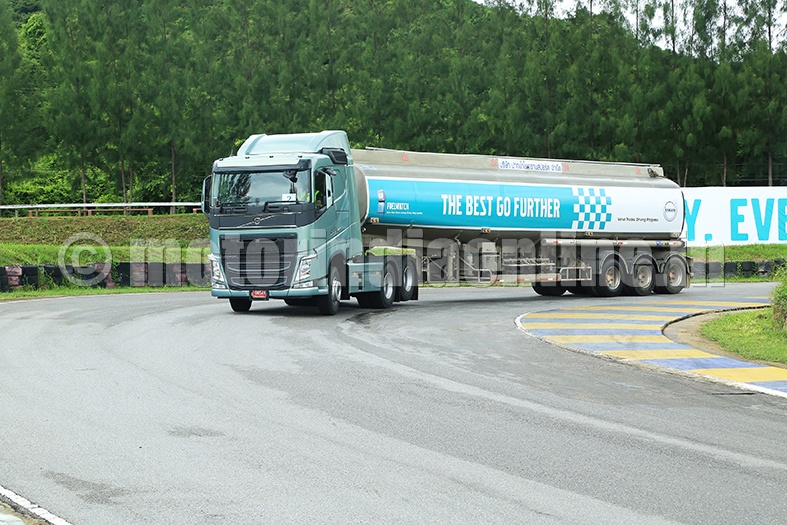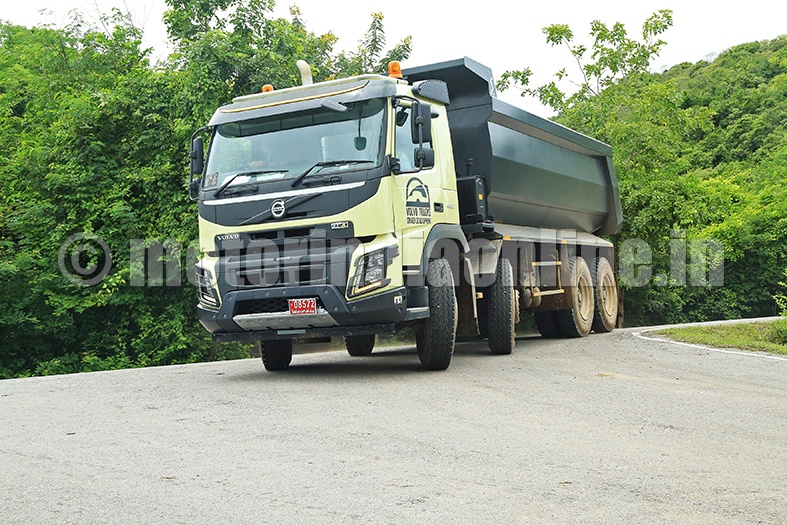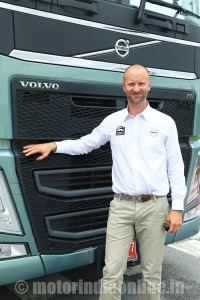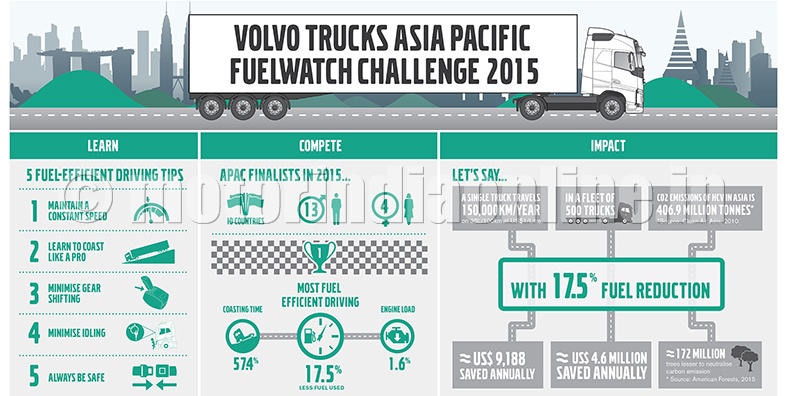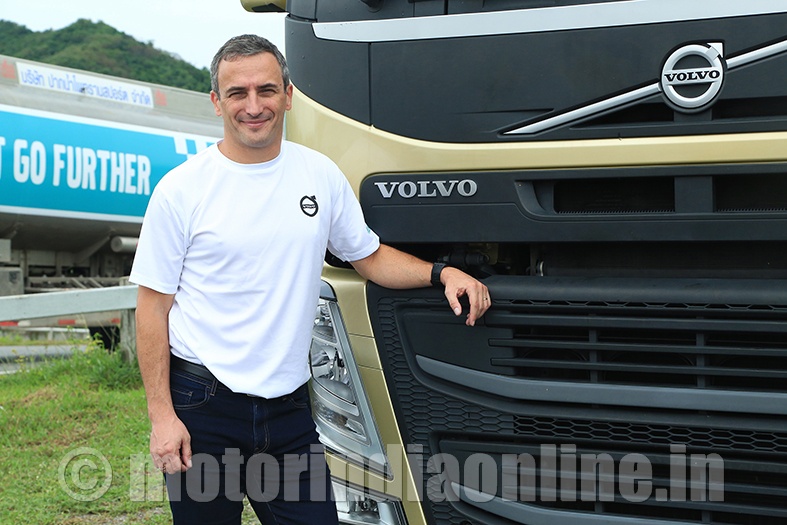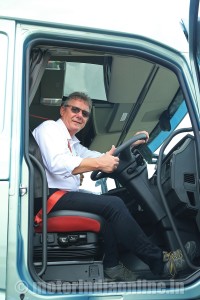Fuelwatch competition sets new benchmark
Volvo Trucks, a global leader in sustainable transport solutions, continues its relentless drive towards setting new benchmarks in terms of quality, performance and safety and enhancing the profitability of its customers around the globe. One inimitable brand which Volvo Trucks has managed to create at the global level is its Fuelwatch competition which is a perfect reflection of the company’s quest to help improve customers save fuel, thereby improving their bottomline.
This September, Motorindia had the opportunity and privilege to witness a record-setting Volvo Trucks Asia Pacific Fuelwatch Challenge 2015 at Hua Hin in Thailand. In what was a truly proud moment for India, Mr. Ravi Poleboina was adjudged the most fuel-efficient driver in the off-road competition, completing his lap with an impressive 12.5 per cent less fuel consumed compared to his fellow three contestants. Earlier this year, he had won the India Fuelwatch competition earlier this year, coming out on top among 15 drivers who competed for the top prize, thereby booking his place in the Asian round of the event in Thailand.
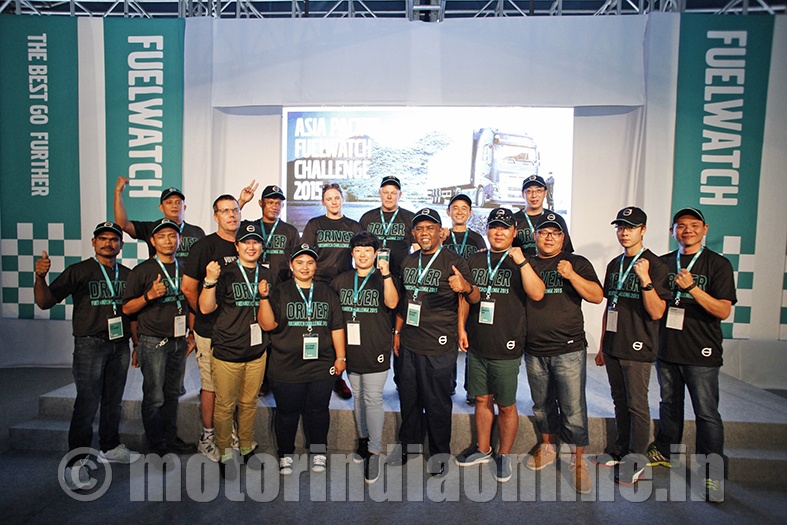
“This is the happiest moment of my life”, said a jubilant Ravi. He added: “I practised well for over a year and continuously tried to improve on my fuel efficiency. I came first among 20 drivers in our company and then managed to win at the national level as well. Truck drivers are usually not treated too well in our country, but after driving Volvo trucks and winning this competition, I have earned special respect. I feel it has given a name for me and for the entire driver community in India and would like to really thank Volvo for this wonderful opportunity.”
Ravi works with SV Engineering Construction, one of Volvo’s largest, oldest and most loyal customers in India. Mr. Venkateswarlu Rachakonda, Manager, Plant and Machinery, SV Engineering Construction, had flown along with Ravi for the competition in Thailand and was thrilled with Ravi’s victorious performance and the whole Fuelwatch experience: “I am delighted with Ravi’s victory here at the Asia Pacific Fuelwatch Challenge. We had participated in the Fuelwatch competition last year with our driver finishing as the runner up in the National level. This year, after a lot of focused training and effort and understanding more about the competition, we managed to win at the India level. It is a great moment for our company and we are 100 per cent satisfied with Volvo’s support and training. Being part of such an event has been very exciting and apart from the competition, we have had the opportunity to know about new technology and driving techniques as well. Overall, it has been a fantastic experience for us and we thank Volvo for the same.”
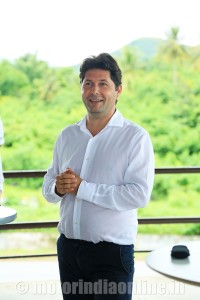
Encouraging inclusive growth
In the on-road category, Ms. Louise Marriott from New Zealand became the first female driver in the competition’s history to achieve a podium finish at the event. Louise consumed 17.5 per cent less fuel compared to the highest amount of fuel burnt at the event, as she beat 12 other drivers in the on-road segment, three of whom were women.
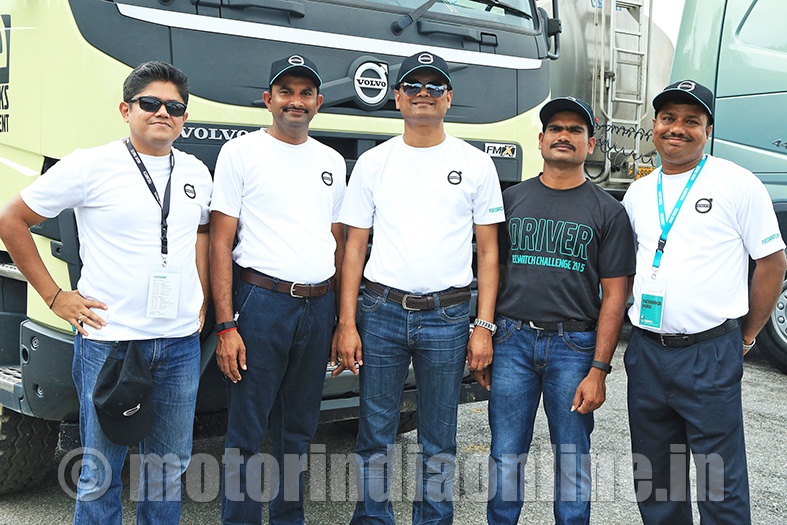
Expressing her elation over the record-setting performance, Louise said: “I’m absolutely pleased to be this year’s most fuel-efficient driver in the on-road segment and to be the first contestant to bring the trophy home to New Zealand. While our industry is often thought of as being male dominated, the Fuelwatch Challenge has been a great platform for us to show that all drivers, regardless of gender, can perform at the highest level while being fuel-efficient. I think the most important thing women need in order to get into the transport industry is confidence and if there’s enough confidence we can be very successful. I look forward to sharing the experience at Fuelwatch with my colleagues back home.”
Congratulating Louise on her achievement, Mr. Christophe Martin, President of Volvo Trucks in Asia Oceania, said: “I am delighted and proud to witness history made at this year’s Asia Pacific Fuelwatch Challenge 2015 with the first female driver joining the ranks of past Fuelwatch winners. Louise’s achievements will no doubt encourage aspiring female drivers, which will benefit the industry as a whole.”
As a reward for their peerless driving, both Ravi and Louise will fly to Sweden next year to compete in the Volvo Fuelwatch Challenge against the best drivers from around the world in their respective categories.
Setting benchmarks
The Volvo Trucks Fuelwatch Challenge kicked-off its local editions in Asia Pacific earlier this year, and saw 17 top drivers qualify to contest for the title of the region’s most fuel-efficient driver in the on-road and off-road categories at the Asia Pacific Fuelwatch Challenge 2015. For the very first time since the inception of the Volvo Fuelwatch Challenge in Korea in 2007, the participant line-up included four women, representing the growing number of female drivers within the Fuelwatch community and the industry-at-large.
The Fuelwatch competition, recognised as an annual mainstay event in the industry, embodies Volvo’s Fuelwatch mission towards a fuel-efficient industry model. During the event, participants attended a one-day training session on fuel-efficient driving techniques and technical expertise, followed by the Asia Pacific Fuelwatch Challenge grand finals on the following day.
Within the industry, fuel can account to up to 50 per cent of the operating costs of a typical haulage business. The fuel-efficiency margins recorded in the on-road and off-road competitions would translate into significant cost savings potential in a real-world context, thereby boosting customers’ profits in a big way.
Outlining Volvo’s vision through its differentiated Fuelwatch initiative, Mr. Martin added: “We at Volvo Trucks are firmly committed to the Fuelwatch mission of optimising performance at minimum cost to businesses, society and the environment. Since our inaugural event in 2007, more than 15,000 participants of the Fuelwatch Challenge have become ambassadors of the Fuelwatch community, sharing the skills and technical knowledge that they have picked up at the event to catalyse our goal of a fuel-efficient industry. Together with them, we look forward to championing the Fuelwatch mission for the industry and the society in the years to come.”
India is one of our important strategic markets globally
– Mr. Tobias Dahlgren, Director, Global Brand Management
What does the Fuelwatch Challenge mean to the Volvo brand?
The Fuelwatch Challenge means a lot to the Volvo brand. Fuel stands for a big share of the cost for our customers – up to 30 per cent in Europe and close to 50 per cent of the total cost in Asia. That means every single per cent we can save through our innovative products and services but also by training our drivers has a huge impact on customers’ bottomline.
The Fuelwatch initiative means a lot for us and also for our customers and it is very well anchored within the Volvo brand through environmental care which is one of our core values, together with safety and quality.
What are your thoughts on this year’s competition and how do you think it would help the competing drivers?
Fuelwatch is in itself a really big engagement and I’m really proud to represent Volvo at this event where we have so many skilled drivers from different parts of the world, bringing their enthusiasm and engagement to the competition. This is a good platform for drivers to showcase their capabilities and also learn new techniques to save fuel which would help their companies become more profitable. The drivers also become good ambassadors of the event when they return home to their respective markets.
How important is the Indian market for the Volvo brand?
India is absolutely one of our important strategic markets across the globe. We see India as an economy and a market which is growing a lot. There is huge potential in the market for sure and we are there to stay in India for the long term. We are looking forward to working with our colleagues in the country and through our joint venture Volvo-Eicher Commercial Vehicles to further strengthen our offerings and build our relationships with customers over a long time, so India is very important for the Volvo brand.
Volvo Trucks has unique competence in India
– Mr. Pierre Jean Verge-Salamon, President, Volvo Group Truck Sales, India
What are your impressions on this year’s Fuelwatch event?
This is my first Fuelwatch competition heading Volvo Truck’s Indian operations and I’m very happy to be here. Each year, the Asia Pacific Fuelwatch Challenge is a unique event where drivers from the region can judge their level of performance and learn a lot of ways to save fuel.
It is Volvo’s mission to share these techniques and ways of using the trucks in the best way to save fuel because it’s not just the latest technology and the best on-road configuration that helps save fuel; it’s the driver who makes a huge difference. So it’s important that our customers realize that investing in people and training will make a lot of difference.
How important is the Indian market for Volvo from an Asia Pacific standpoint?
The important of India is surely getting bigger and bigger across Asia because the Indian market is extremely dynamic. At present, it is the only growing market across Asia and it is by far the largest market in Asia for mining. Volvo has developed a set of expertise including 1,000 engineers in Bangalore who work on our products and services for India as well as overseas markets. We have the capability to provide solutions for demanding off-road operations which shows that India has unique competence when compared to other markets in Asia.
What efforts do you think are necessary to improve the competence of drivers in India?
We need to pay more attention to people in general in India. We need to set up training schools and centres which focus on a set of activities to increase the awareness and competence of the drivers and operators of our machines. Once that’s done, we can really leverage better the benefits our products offer.
Lastly, since you have recently taken over as the head of Volvo Trucks’ Indian operations, what are the top three priorities in your agenda?
My first priority would be to continue our good performance in the premium truck market. There are plenty of opportunities and we see good growth momentum at present as well. My second priority is towards people at large – people in our organization, in the Volvo Group and at our customer and partner premises because they are part of the key to our success in the market. All around the world and particularly in Asia, having access to technology and finance is not a big issue today; the challenge is to get access to competent people and keeping them with you. The third priority is to raise the voice of India within our organization. With the truck market in India recovering after a long time, I can see the magnitude of the giant which is awakening now and we want to make sure we are part of the market growth in a big way.
Volvo Trucks is willing to do anything for driver training
– Mr. Per Bruun Hansen, Driver Development Manager Asia, Volvo Group Trucks Sales
With growing global focus on improving fuel efficiency and reducing emissions, how significant is the Fuelwatch initiative?
Good fuel efficiency is definitely fantastic because saving fuel is a good thing and everyone likes to earn more money. But while saving fuel the drivers also do a lot of other things such as drive safely, observe and plan well, save a lot of wear and tear on the truck, say for instance, the brakes are not used much. This way the Fuelwatch initiative offers a lot of takeaway for the driver, the customer, the environment and so on.
Fuelwatch being a global event, how do you maintain uniformity in driver training across different regions?
Volvo has driver training centres and driver trainers across the world. In India, for instance, we have our driver training centre in Bangalore where around 10 to 12 driver trainers have been trained. They are currently based in different parts of the country and conduct ‘train the trainer’ programs and make sure the training is as per our standards. We do the same thing in different regions and maintain the same standard of training across the world.
What does it take to become a Volvo driver trainer? How many driver trainers do you have across Asia Pacific?
Being a Volvo driver trainer takes a bit more than the title. Our driver trainers must be experienced and must be able to perform demonstrations. Our driver trainers do no sit in the passenger seat and point at buttons; they sit in the driver seat and show the driver trainees how to drive in the best and most fuel efficient manner. We have close to 40 driver trainers across the Asia Pacific region today.
What are the aspects covered in your driver training course?
We train the drivers to have an open mind and a good attitude which can be little tricky at times. We ask them not to be robots and tell them to assess the situation they are in and to try and plan ahead. How to drive on flat surfaces, on hilly terrain, with a 200-ton load on the trailer, etc. are very different and require tailor-made training, so the most fuel efficient driving depends on many factors. Today’s trucks are packed with technology, so there might be sensors and lot other features in the truck, but it cannot see the road in front of it (at least for now!). The driver is not obsolete and is still a very important tool.
What should a market like India do to improve the status/respect of the driver community? Do you see the role of women increasing in the truck driving profession?
The drivers need to be treated with respect and the companies should probably not expect the driver to work 20 hours a day. Employing female drivers could be a good option because they have some advantages like being gentle on the gear which results in better fuel efficiency. If I had a transport company, I would go and look for some females, set up my training and train them well.
We have four women finalists here at this year’s competition. They are from New Zealand, China, Taiwan and Korea and come from companies that are willing to invest in training which is a very important factor. The companies need to invest in training and Volvo Trucks is ready to support them by setting up training programs especially for female drivers.
What will be the way forward for Volvo with regard to driver training?
We will be much more involved in the companies that buy our trucks through training and developing training. Whatever might be required by our customers, Volvo Trucks is willing to do anything when it comes to training – moving dangerous goods, load restraint, safe driving, cargo security, etc. – we are ready.
